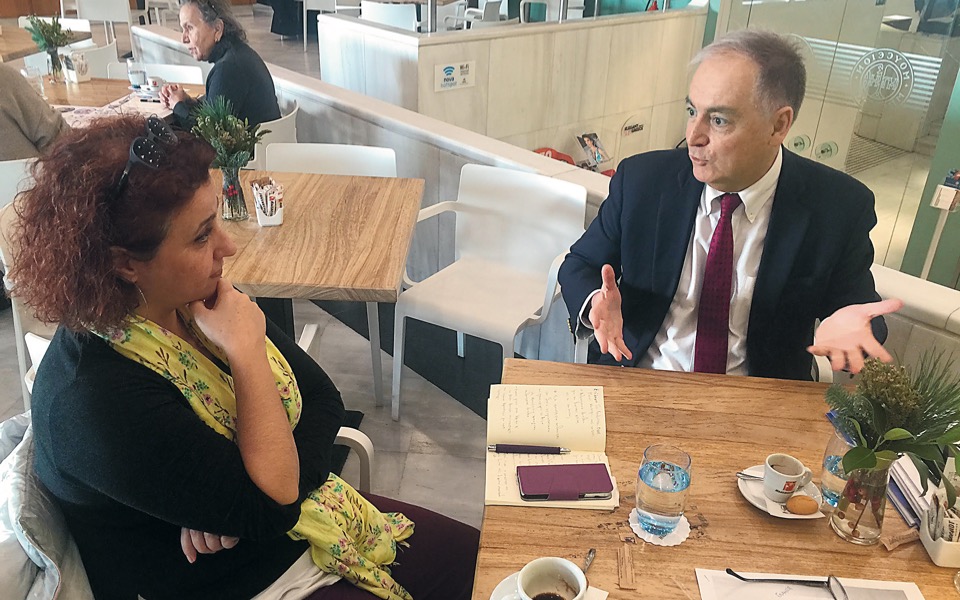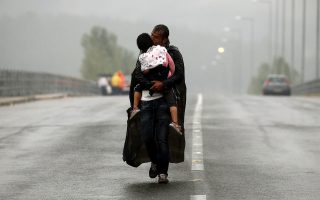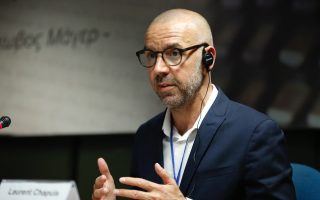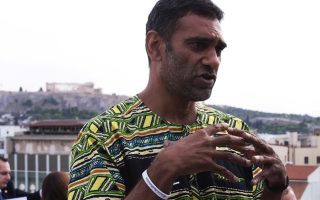Greek UN official says humanity failed in Syria

He works in Amman, Jordan, but also in Ankara, Iraq and at the United Nations Office at Geneva. As the United Nations regional humanitarian coordinator for the Syria crisis since 2017, Panos Moumtzis’ work has taken him around the world. “I rarely sleep in the same place for more than three days,” he told Kathimerini during an interview.
Having spent more than 30 years in the field, he has witnessed more conflicts than most – in the Gaza Strip, Iraq, Somalia, Rwanda, Burundi, the Democratic Republic of Congo, Bosnia, and now in Syria. He has observed scenes where “every humanity has vanished, where there is nothing human.” Nevertheless, he firmly insists, “this is the only job I would like to do. The satisfaction I feel when we manage to help, when the population is somewhat better [off afterward] – no other job, no financial reward can offer that.”
Smiling, polite and affable, he was very happy when we met because the next day he was planning to head off for a few days on Symi, the Dodecanese island that he, his journalist wife and their three children call their “anchor.” “For us, Symi is healing. We may travel all around the world, but we have returned to the island every summer for 20 years now.”
The Syrian doctor
Why Symi? I asked him. “I would say by chance, but who knows?” he replied. After a lengthy pause he started speaking again. “In the summer of 2015 I was sitting with my family at a taverna on a beach. We saw a coast guard vessel loaded with people found at sea, and I ran to help because I speak Arabic. They were tired, worn out, thirsty. Suddenly, among the people who got off the boat we saw our children’s pediatrician from Syria. There, on the beach on Symi, among refugees, with his family, was a man we knew well, who had been to our home many times, whom we called during the night when we needed help. We invited them to our house and they told us a lot. It’s always difficult when you hear a story about specific people.”
And thus our discussion shifted to his work. “In Syria, the United Nations has one of the largest humanitarian programs in the world. It is estimated that 13 million people are in need of humanitarian aid. We provide monthly assistance to 5 million. In the whole country there are more than 10,000 people offering humanitarian aid, while the budget of the United Nations program in Syria amounts to 3.5 billion euros and in neighboring countries 5 billion.
“For us, our immediate priority is the relief of the civilian population and the protection of human rights. We help the Syrians wherever they are in Syria provided that we can approach them and that our staff will be safe. Whether in a government or opposition area, a family with children is a family with children everywhere,” said Moumtzis.
He opened up a map he had brought with him, trying to explain the complexity of the situation. “Syria is one of the most complex political and military situations I have ever faced, where many countries are involved, and the people are the most adversely affected. In Syria there are more than 85 military factions located in different regions,” he said.
How is it possible to provide help under such circumstances? I wondered. “We do not give any opinion on politics,” he said. “We collaborate with everyone. I talk to everyone, I greet everybody. Our only request is to have access to those in need in order to be able to save lives. With our presence, the fact that we are there and can see and hear what is happening also contributes a certain amount to security and respect for human rights.”
The United Nations supports civilians in Syria at a family level with a personal presence. It does not provide assistance in cooperation with local groups and does not accept donations for specific populations. Who is in need and what they need in these extreme conditions is decided according to technocratic criteria, precisely in order to protect the work of the United Nations. Of course, not only do demands for humanitarian aid often fall on deaf ears, but attacks on and mistreatment of civilians are used as leverage. “I was talking to a woman in Idlib, northwestern Syria, who was at the market when it was bombed and her three children were injured. She took them to the hospital and an hour later the hospital was bombed as well.” He took a sip of water as though trying to put his memories in order. “Children’s protection, which is a basic principle all over the world, is being violated by everyone in Syria,” he concluded.
Childhood memories
The path to Moumtzis’ future career began during his early childhood in Cairo. “The first time I wondered why there was war was during the 1967 and 1973 [Arab-Israeli] wars, when we had to turn off the lights and go down to the basement because of bombardments, listening to the sirens and planes. I think it was then that I started to wonder what I could do to make a difference.” However, he never imagined that he would experience what he has lived through since, situations where human life does not matter. His worst moment? Without hesitation he replied: “The genocide in Rwanda. A river crossing a city, full of corpses.”
Is he ever afraid? “Of course,” he shot back without a second thought. “Often the decisions you have to make are close to the limit. It’s a delicate balance to try to be as close as possible [to the people who need you] while at the same time keeping the staff safe.”
From Syria our conversation moved to Greece and the pressures the country has been under. “In the first days of the crisis I was at a camp in Jordan. A grandfather was carrying large bags of food. So I greeted him and said, ‘From the things that you are carrying I guess you must have a big family.’ He answered, ‘Yes. I am here with my four sons, their wives and my grandchildren. We all came here.’ I asked, ‘Why aren’t they helping you?’ He put the stuff down, took a deep breath and told me: ‘Look, in the village where we lived I used to help others. I do not want my grandchildren to see me coming here as a beggar to get help.’ The people who leave do so because extreme things are happening. The Syrians have a sense of dignity and pride. Wherever they are, they work. And if things get better, even a little, they will return because they have very strong ties with their country and their families,” he concluded.
Motivation
“Do you feel disappointed sometimes?” I asked. “Very often,” he replied, adding: “Most of the time I feel disappointed. Think, after World War II, we tried to organize an international society so there would be peace and we could all live together. And now here we are in 2019 and we see kids being bombed in their schools. There are millions of refugees and displaced people. Eight years of negotiations for Syria and nothing has been done yet. We failed as a society and as a Security Council. But when we fail we are motivated to keep trying.”
“Being Greek is very helpful in the work I do. Greece has not been involved in the defense of great political and economic interests, and we Greeks have a history of democracy and hardship. All of this helps us to be more easily accepted, for all sides to agree more easily to sit with us at the negotiating table. It is a pity that the Greeks who work internationally in this area are so few. Everyone wants to go to Brussels. Well, there is the United Nations as well. Of course, you need to know what you want to do and be willing to say, ‘In the next three years I will work in Afghanistan or in Somalia.’ You have to think of what is important to you, what it is that keeps you awake at night.”





